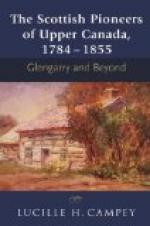The King’s birthday was celebrated with, no doubt, somewhat tipsy rejoicings in the summer of 1763. The Ojibwe Indians outside the fort pretended they were going to have a great game of La Crosse with the S[-a]ki or “Fox” Indians. This game was got up to find a pretext for entering the fort and taking the British officers and garrison at a disadvantage. Some of the officers and soldiers, suspecting nothing in the way of danger, were outside the fort by the waterside. However, the sport commenced, and suddenly the ball was struck over the pickets of the fort. At once the Ojibwes, pretending great ardour in their game, came leaping, struggling and shouting over the defences into the fort as though “in the unrestrained pursuit of a rude, athletic exercise”. Once inside the fortifications, they attacked the unsuspicious and unarmed soldiers and officers, of whom they killed seventy out of ninety.
Henry had not gone with the others, but had stayed in his room writing letters. Suddenly he heard the Indian warcry and a noise of general confusion. Looking out of his window he saw a crowd of Indians inside the fort furiously cutting down and scalping every Englishman they could reach. Meantime, the French Canadian inhabitants of the fort looked on calmly, neither intervening to stop the Indians, nor suffering any injury from them. Realizing that all his fellow countrymen were practically destroyed, Henry endeavoured to hide himself. He entered the house of his next-door neighbour, a Frenchman, and found the whole family at the windows gazing at the scene of blood before them. He implored this Frenchman to put him into some place of safety until the massacre was over. The latter merely shrugged his shoulders and intimated that he could do nothing for him; but a Pani Indian woman, a slave of this Frenchman, beckoned to Henry to follow her, and hid him in a garret. Then the Indians burst into the house and asked the Frenchman if he had got any Englishmen concealed, the latter returned an evasive answer, telling them to search for themselves. Henry hid himself under a heap of birch-bark vessels, which were used in maple-sugar manufacture. The door was unlocked, the four Indians dashed in, their bodies covered with blood, and armed with tomahawks. The hidden man thought that the throbbing of his heart must make a noise loud enough to betray him. The Indians searched the garret, and one of them approached Henry so closely as almost to touch him; yet he remained undiscovered, possibly owing to the dark colour of his clothes and the dim light in the room. Then the Indians, after describing to the Frenchman how many they had killed and scalped, returned downstairs, and the door was locked behind them.




